Unit 1 Past and Present Comic strip & welcome to the unit课件(40张PPT)
文档属性
| 名称 | Unit 1 Past and Present Comic strip & welcome to the unit课件(40张PPT) | 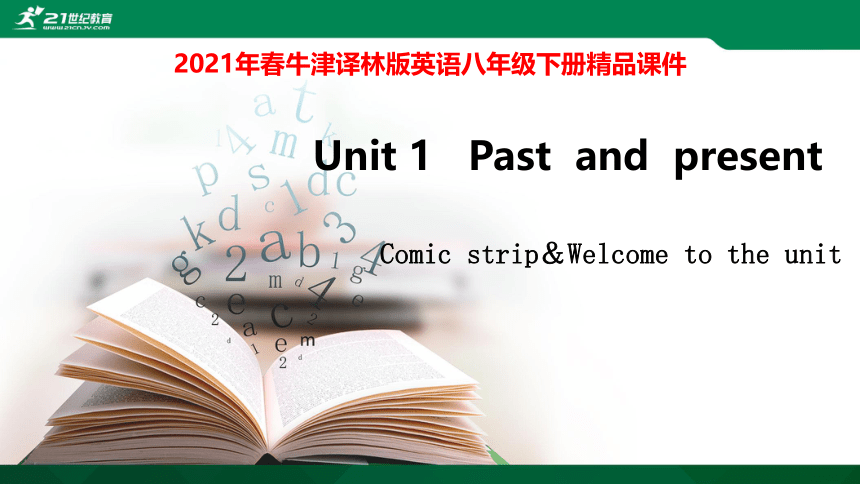 | |
| 格式 | pptx | ||
| 文件大小 | 5.7MB | ||
| 资源类型 | 试卷 | ||
| 版本资源 | 牛津译林版 | ||
| 科目 | 英语 | ||
| 更新时间 | 2021-02-28 22:04:22 | ||
图片预览

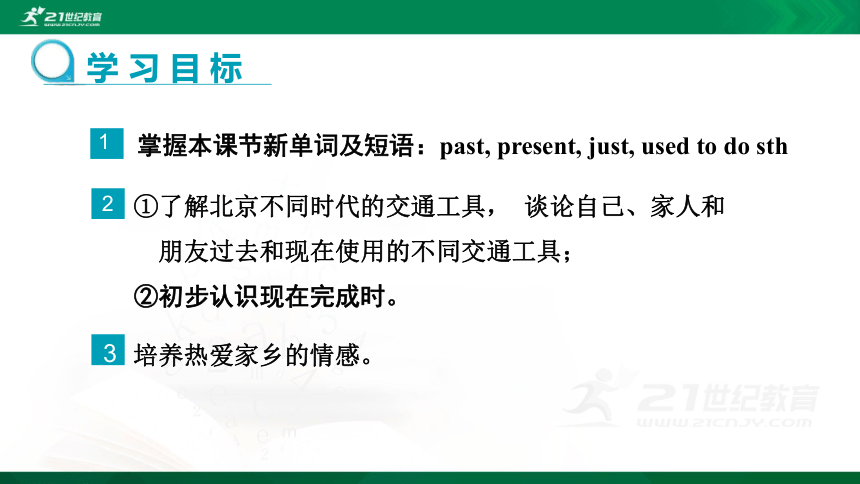

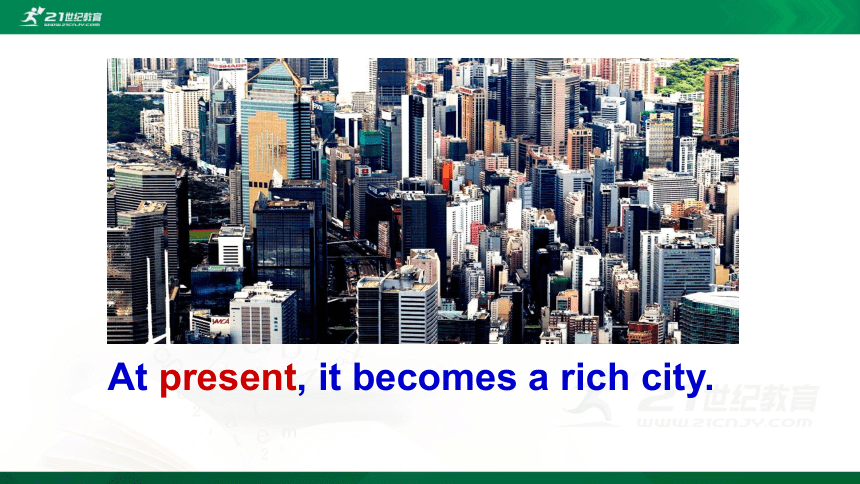
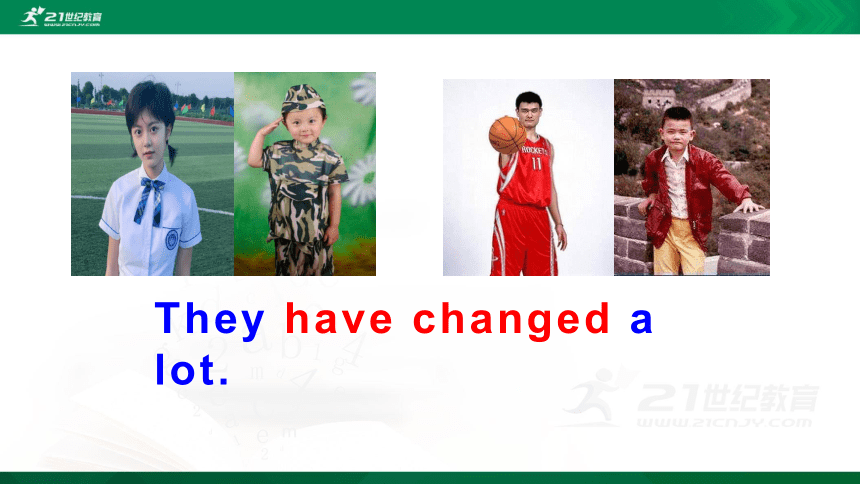
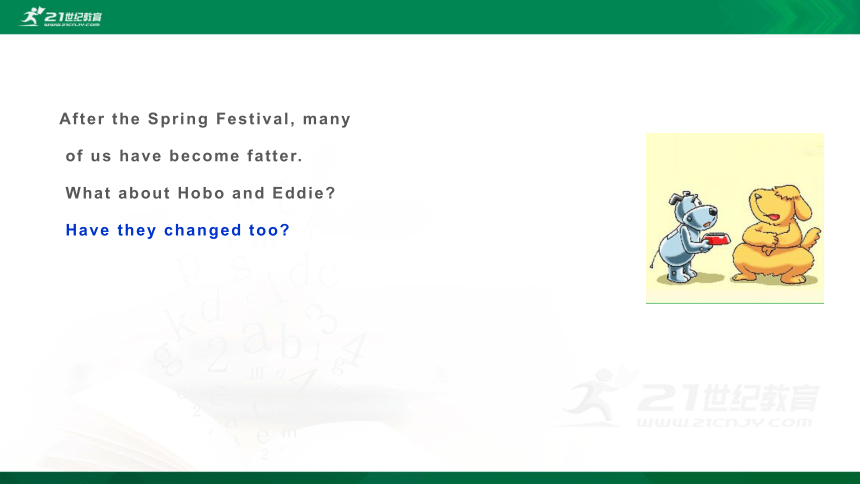
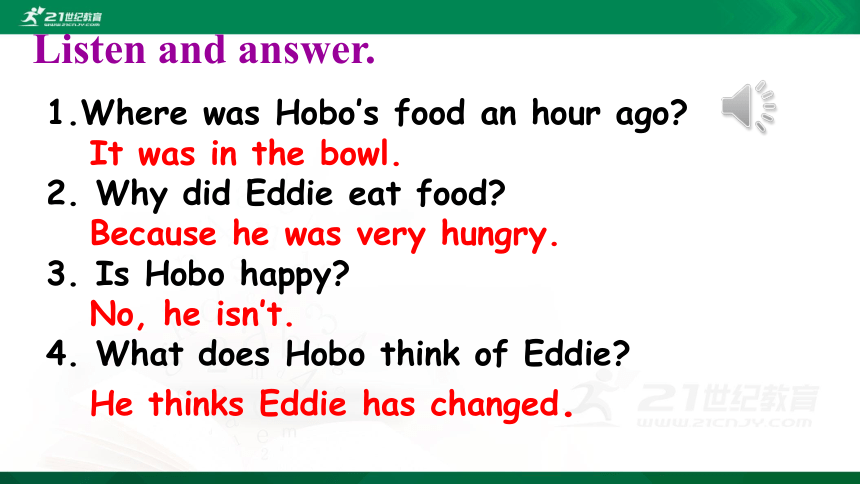
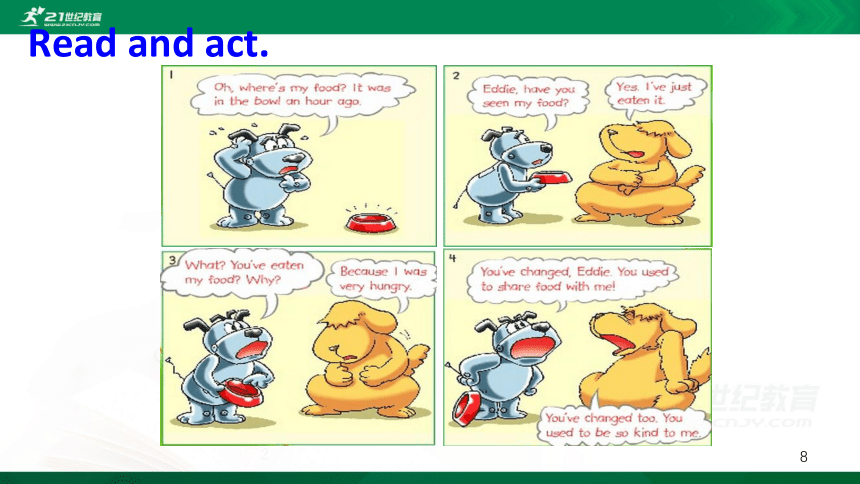
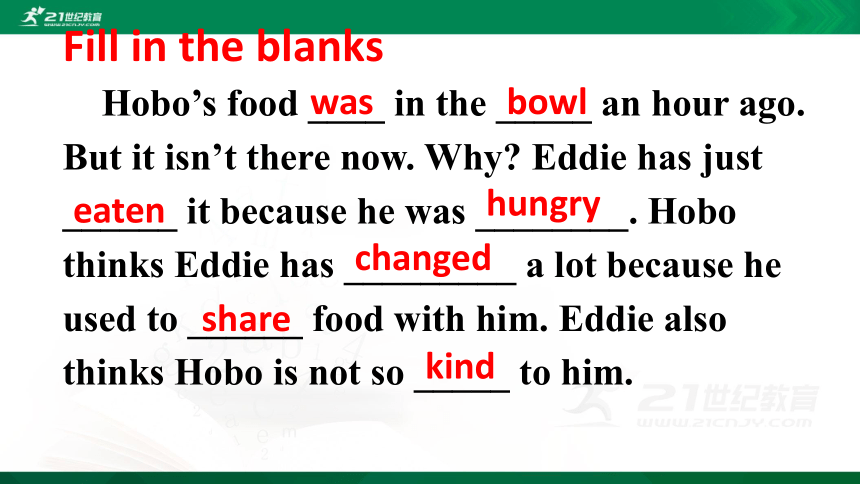

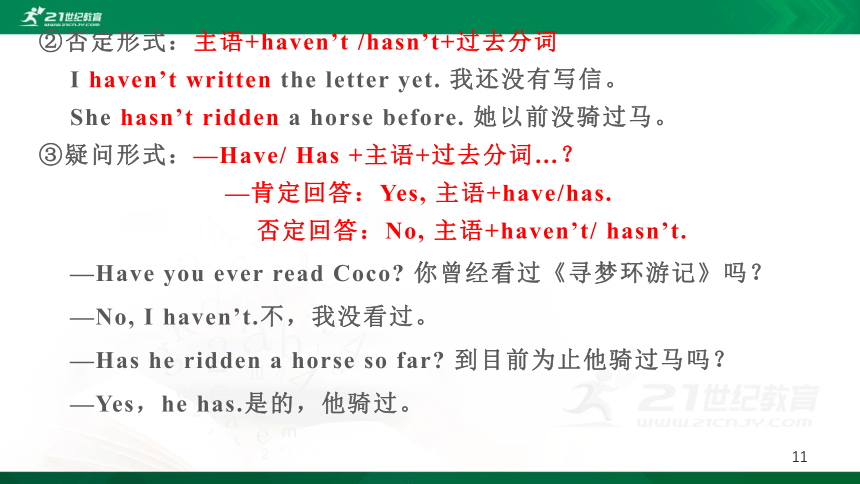

文档简介
Unit 1 Past and present
Comic strip&Welcome to the unit
2021年春牛津译林版英语八年级下册精品课件
学 习 目 标
掌握本课节新单词及短语:past, present, just, used to do sth
1
3
培养热爱家乡的情感。
①了解北京不同时代的交通工具, 谈论自己、家人和
朋友过去和现在使用的不同交通工具;
②初步认识现在完成时。
2
In the past, it was a poor village.
= It used to be a poor village.
课 堂 导 入
At present, it becomes a rich city.
They have changed a lot.
After the Spring Festival, many
of us have become fatter.
What about Hobo and Eddie?
Have they changed too?
Where was Hobo’s food an hour ago?
It was in the bowl.
2. Why did Eddie eat food?
Because he was very hungry.
3. Is Hobo happy?
No, he isn’t.
4. What does Hobo think of Eddie?
He thinks Eddie has changed.
Listen and answer.
Read and act.
Fill in the blanks
Hobo’s food ____ in the _____ an hour ago. But it isn’t there now. Why? Eddie has just ______ it because he was ________. Hobo thinks Eddie has _________ a lot because he used to ______ food with him. Eddie also thinks Hobo is not so _____ to him.
was
bowl
eaten
hungry
changed
share
kind
1. A:Have you seen my food? 你看见我的食物了吗?
B: Yes. I’ve just eaten it. 是的,我刚刚把它吃完。
Explanation
现在完成时
①肯定形式: 主语+have/ has +过去分词
He has already eaten a bar of chocolate.
他已经吃了一块巧克力。
My hometown has changed a lot in the past twenty years.
我的家乡在最近的二十年里发生了翻天覆地的变化。
②否定形式:主语+haven’t /hasn’t+过去分词
I haven’t written the letter yet. 我还没有写信。
She hasn’t ridden a horse before. 她以前没骑过马。
③疑问形式:—Have/ Has +主语+过去分词…?
—肯定回答:Yes, 主语+have/has.
否定回答:No, 主语+haven’t/ hasn’t.
—Have you ever read Coco? 你曾经看过《寻梦环游记》吗?
—No, I haven’t.不,我没看过。
—Has he ridden a horse so far? 到目前为止他骑过马吗?
—Yes,he has.是的,他骑过。
2. I've just eaten it.我刚才把它吃了。
just adv. 意为“刚才”,常与完成时连用。
They have just arrived.他们刚刚到达。
【注意】
just now 意为“刚才”,相当于a moment ago, 通
常与一般过去时连用。
I went to the library just now.我刚才去了图书馆。
3. You used to be so kind to me. 你过去对我那么好。
used to do sth. 过去常常做某事
表示过去经常做或一直做某事,而现在不做了,它只表示过
去时态。
①肯定形式: 主语+used to+动词原形
She used to be a history teacher. 她过去是一名历史老师。
He used to listen to pop music ,but now he likes rock music.
他过去总听流行音乐,但现在喜欢摇滚了。
②否定形式:主语+used not to+动词原形...
主语+didn’t use to+动词原形...
The shop usedn’t to open on Sundays .
=The shop didn’t use to open on Sundays.
过去这家商店星期天不营业。
③疑问形式:Used +主语+ to +动词原形...
Did +主语+ use to +动词原形...
Used you to go to the museum?=Did you use to go to the museum? 你昔日可常去博物馆?
【拓展】
①There used to be...曾经有……;过去常常有……
There used to be a steel factory.
往日此处曾有一家钢铁厂。
②be used to doing sth.习惯于做某事
My father is used to reading newspapers after dinner.
我父亲习惯晚饭后读报。
(1)我已经读过这本杂志了。(完成句子)
I _____ ______ _____ the magazine.
→否定句:
I ________ _______ the magazine ________.
→一般疑问句:
_______ ______ already ______ the book?
Exercises:
have already read
haven’t read
yet
Have you
read
(2)他过去常练习下棋。(完成句子)
He _____ __ ________ playing chess.
→否定句:
He ______ ______ _______ playing chess.
He _____ _____ ___ _______ playing chess.
→一般疑问句:
______ he ____ _________ playing chess?
______ he ____ ___ ________playing chess.
used to practise
usedn’t to practise
didn’t use to practise
Used to practise
Did use to practise
In the past
In the past, people usually rode bikes when they went to a place nearby.
=People used to ride bikes when they
went to a place nearby.
At present
At present, shared bikes are becoming more and more popular in our daily life.
an e-bike
It is easy for us to get around on shared bikes.
We should park the shared bikes in a proper place.
shared bikes
In the past
In the past, people usually took a green train
to go to other cities.
It took about 12 hours from Lianyungang
to Beijing on a green train.
At present
At present, people usually take high-speed trains to go to other cities.
It takes about 6 hours from Lianyungang to
Beijing by high-speed train.
In the past
In the past, a conductor sold tickets to people after they got on the bus.
a conductor
At present, we can swipe an IC card or
a cell phone to get on a bus.
At present
It is the fastest way of travelling to a place far away, but it will cost you a lot of money.
A plane.
A guessing game
It is a comfortable bus for
carrying people over a long way.
A coach.
Thousands of people go to work on it every day. It is fast and it is under the ground.
An underground.
(A subway)
It is a car with a driver, and you have to pay the driver to take you somewhere.
A taxi.
coach
bus
taxi
underground
train
plane
Write the correct names under the pictures.
Listen and answer
1.How did Millie’s dad go to school when he
was a student?
2. Why didn’t he take a bus?
3. How does Millie go to school?
He used to go to school by bike.
Because there were too many people on the bus.
She goes to school by bus.
Read the dialogue (on p.7)
M: How did you go to school when you were a student, Dad?
D : I used to go to school by bike.
M: Why didn’t you take a bus?
D : Well, there were always too many people on the bus, and it took a long time to wait for the next one.
M:Really? I go to school by bus. Now it’s easy
and fast.
Fill in the blanks
Millie’s dad went to school when he was a student. He u____ to go to school by bike.
He didn’t take a bus b________ there were too many people on it. And it t____ a long time to wait for the next o_____. However, Mille goes to school by bus at p________. Because it is e____and fast.
sed
ecause
ook
ne
asy
resent
Make a dialogue and act it out.
S1: How did you … when you were a primary student?
S2: I used to … by …
S1: Why didn’t you take a …?
S2: Because…
S1: How do you … now?
S2: I …by underground/….
past
present
go to school
on foot/ by bike
by bike/bus/underground
go around the city
by bus
by bus/taxi/car
go to other cities
by coach
by coach/train/plane
{5C22544A-7EE6-4342-B048-85BDC9FD1C3A}Transport
Advantages
Disadvantages
Cars
1. comfortable
2. run fast
3. …
1. traffic jams
2. pollute our environment
3. …
…
…
…
Discussion
{5C22544A-7EE6-4342-B048-85BDC9FD1C3A}Aspects
In the past
At present
1. The forms of
having classes
in the classroom
…
online classes
…
2. The ways of
spending the
Spring Festival
have big meals
…
chat online
…
3. …
…
…
I. 首字母填空
1.My daughter studied very hard in the p .
2.I’m afraid I can’t help you at p .
3.Great changes have t________ place in Wuxi since 1949.
4.My father often goes to work by u .
5.At the fashion show, people wore clothes from different t .
ast
resent
aken
nderground
imes
课 堂 达 标
II.翻译句子。
1.我刚吃过午饭。
I have just eaten lunch.
2.我饱了,我不想再吃东西了。
I am full, I don’t want to eat any more.
3.一小时前这支钢笔还在铅笔盒里.
This pen was in the pencil case an hour ago.
4.你看见我的自行车了吗?
Have you seen my bike?
5.—你乘过地铁吗?—从来没有。
—Have you taken an underground? —Never.
6.我已经吃过苹果了。
7.他过去常常和朋友们踢足球.
8.你看过这部新电影了吗?
9.你每天怎样去上学?
I have eaten an apple.
Have you seen this new film?
How do you go to school every day?
He used to play football with his friends.
1. Finish the exercises.
2. Complete the report.
3. Preview Reading .
Homework
谢谢
21世纪教育网(www.21cnjy.com) 中小学教育资源网站
有大把高质量资料?一线教师?一线教研员?
欢迎加入21世纪教育网教师合作团队!!月薪过万不是梦!!
详情请看:
https://www.21cnjy.com/help/help_extract.php
Comic strip&Welcome to the unit
2021年春牛津译林版英语八年级下册精品课件
学 习 目 标
掌握本课节新单词及短语:past, present, just, used to do sth
1
3
培养热爱家乡的情感。
①了解北京不同时代的交通工具, 谈论自己、家人和
朋友过去和现在使用的不同交通工具;
②初步认识现在完成时。
2
In the past, it was a poor village.
= It used to be a poor village.
课 堂 导 入
At present, it becomes a rich city.
They have changed a lot.
After the Spring Festival, many
of us have become fatter.
What about Hobo and Eddie?
Have they changed too?
Where was Hobo’s food an hour ago?
It was in the bowl.
2. Why did Eddie eat food?
Because he was very hungry.
3. Is Hobo happy?
No, he isn’t.
4. What does Hobo think of Eddie?
He thinks Eddie has changed.
Listen and answer.
Read and act.
Fill in the blanks
Hobo’s food ____ in the _____ an hour ago. But it isn’t there now. Why? Eddie has just ______ it because he was ________. Hobo thinks Eddie has _________ a lot because he used to ______ food with him. Eddie also thinks Hobo is not so _____ to him.
was
bowl
eaten
hungry
changed
share
kind
1. A:Have you seen my food? 你看见我的食物了吗?
B: Yes. I’ve just eaten it. 是的,我刚刚把它吃完。
Explanation
现在完成时
①肯定形式: 主语+have/ has +过去分词
He has already eaten a bar of chocolate.
他已经吃了一块巧克力。
My hometown has changed a lot in the past twenty years.
我的家乡在最近的二十年里发生了翻天覆地的变化。
②否定形式:主语+haven’t /hasn’t+过去分词
I haven’t written the letter yet. 我还没有写信。
She hasn’t ridden a horse before. 她以前没骑过马。
③疑问形式:—Have/ Has +主语+过去分词…?
—肯定回答:Yes, 主语+have/has.
否定回答:No, 主语+haven’t/ hasn’t.
—Have you ever read Coco? 你曾经看过《寻梦环游记》吗?
—No, I haven’t.不,我没看过。
—Has he ridden a horse so far? 到目前为止他骑过马吗?
—Yes,he has.是的,他骑过。
2. I've just eaten it.我刚才把它吃了。
just adv. 意为“刚才”,常与完成时连用。
They have just arrived.他们刚刚到达。
【注意】
just now 意为“刚才”,相当于a moment ago, 通
常与一般过去时连用。
I went to the library just now.我刚才去了图书馆。
3. You used to be so kind to me. 你过去对我那么好。
used to do sth. 过去常常做某事
表示过去经常做或一直做某事,而现在不做了,它只表示过
去时态。
①肯定形式: 主语+used to+动词原形
She used to be a history teacher. 她过去是一名历史老师。
He used to listen to pop music ,but now he likes rock music.
他过去总听流行音乐,但现在喜欢摇滚了。
②否定形式:主语+used not to+动词原形...
主语+didn’t use to+动词原形...
The shop usedn’t to open on Sundays .
=The shop didn’t use to open on Sundays.
过去这家商店星期天不营业。
③疑问形式:Used +主语+ to +动词原形...
Did +主语+ use to +动词原形...
Used you to go to the museum?=Did you use to go to the museum? 你昔日可常去博物馆?
【拓展】
①There used to be...曾经有……;过去常常有……
There used to be a steel factory.
往日此处曾有一家钢铁厂。
②be used to doing sth.习惯于做某事
My father is used to reading newspapers after dinner.
我父亲习惯晚饭后读报。
(1)我已经读过这本杂志了。(完成句子)
I _____ ______ _____ the magazine.
→否定句:
I ________ _______ the magazine ________.
→一般疑问句:
_______ ______ already ______ the book?
Exercises:
have already read
haven’t read
yet
Have you
read
(2)他过去常练习下棋。(完成句子)
He _____ __ ________ playing chess.
→否定句:
He ______ ______ _______ playing chess.
He _____ _____ ___ _______ playing chess.
→一般疑问句:
______ he ____ _________ playing chess?
______ he ____ ___ ________playing chess.
used to practise
usedn’t to practise
didn’t use to practise
Used to practise
Did use to practise
In the past
In the past, people usually rode bikes when they went to a place nearby.
=People used to ride bikes when they
went to a place nearby.
At present
At present, shared bikes are becoming more and more popular in our daily life.
an e-bike
It is easy for us to get around on shared bikes.
We should park the shared bikes in a proper place.
shared bikes
In the past
In the past, people usually took a green train
to go to other cities.
It took about 12 hours from Lianyungang
to Beijing on a green train.
At present
At present, people usually take high-speed trains to go to other cities.
It takes about 6 hours from Lianyungang to
Beijing by high-speed train.
In the past
In the past, a conductor sold tickets to people after they got on the bus.
a conductor
At present, we can swipe an IC card or
a cell phone to get on a bus.
At present
It is the fastest way of travelling to a place far away, but it will cost you a lot of money.
A plane.
A guessing game
It is a comfortable bus for
carrying people over a long way.
A coach.
Thousands of people go to work on it every day. It is fast and it is under the ground.
An underground.
(A subway)
It is a car with a driver, and you have to pay the driver to take you somewhere.
A taxi.
coach
bus
taxi
underground
train
plane
Write the correct names under the pictures.
Listen and answer
1.How did Millie’s dad go to school when he
was a student?
2. Why didn’t he take a bus?
3. How does Millie go to school?
He used to go to school by bike.
Because there were too many people on the bus.
She goes to school by bus.
Read the dialogue (on p.7)
M: How did you go to school when you were a student, Dad?
D : I used to go to school by bike.
M: Why didn’t you take a bus?
D : Well, there were always too many people on the bus, and it took a long time to wait for the next one.
M:Really? I go to school by bus. Now it’s easy
and fast.
Fill in the blanks
Millie’s dad went to school when he was a student. He u____ to go to school by bike.
He didn’t take a bus b________ there were too many people on it. And it t____ a long time to wait for the next o_____. However, Mille goes to school by bus at p________. Because it is e____and fast.
sed
ecause
ook
ne
asy
resent
Make a dialogue and act it out.
S1: How did you … when you were a primary student?
S2: I used to … by …
S1: Why didn’t you take a …?
S2: Because…
S1: How do you … now?
S2: I …by underground/….
past
present
go to school
on foot/ by bike
by bike/bus/underground
go around the city
by bus
by bus/taxi/car
go to other cities
by coach
by coach/train/plane
{5C22544A-7EE6-4342-B048-85BDC9FD1C3A}Transport
Advantages
Disadvantages
Cars
1. comfortable
2. run fast
3. …
1. traffic jams
2. pollute our environment
3. …
…
…
…
Discussion
{5C22544A-7EE6-4342-B048-85BDC9FD1C3A}Aspects
In the past
At present
1. The forms of
having classes
in the classroom
…
online classes
…
2. The ways of
spending the
Spring Festival
have big meals
…
chat online
…
3. …
…
…
I. 首字母填空
1.My daughter studied very hard in the p .
2.I’m afraid I can’t help you at p .
3.Great changes have t________ place in Wuxi since 1949.
4.My father often goes to work by u .
5.At the fashion show, people wore clothes from different t .
ast
resent
aken
nderground
imes
课 堂 达 标
II.翻译句子。
1.我刚吃过午饭。
I have just eaten lunch.
2.我饱了,我不想再吃东西了。
I am full, I don’t want to eat any more.
3.一小时前这支钢笔还在铅笔盒里.
This pen was in the pencil case an hour ago.
4.你看见我的自行车了吗?
Have you seen my bike?
5.—你乘过地铁吗?—从来没有。
—Have you taken an underground? —Never.
6.我已经吃过苹果了。
7.他过去常常和朋友们踢足球.
8.你看过这部新电影了吗?
9.你每天怎样去上学?
I have eaten an apple.
Have you seen this new film?
How do you go to school every day?
He used to play football with his friends.
1. Finish the exercises.
2. Complete the report.
3. Preview Reading .
Homework
谢谢
21世纪教育网(www.21cnjy.com) 中小学教育资源网站
有大把高质量资料?一线教师?一线教研员?
欢迎加入21世纪教育网教师合作团队!!月薪过万不是梦!!
详情请看:
https://www.21cnjy.com/help/help_extract.php
